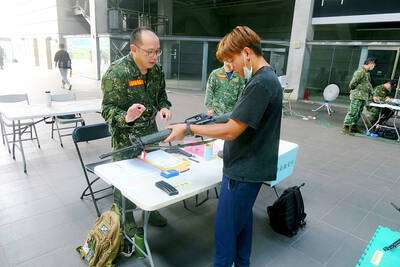In an unusual move, a nine-member Control Yuan panel yesterday vetoed the proposed impeachment of three former Taipei City Government officials in charge of the city's handling of SARS last year.
The nine members of the closed-door panel overruled three proposals initiated by Control Yuan members Chao Chang-ping (趙昌平), Lee Shen-yi (李伸一), Liao Jiann-nan (廖健男) and Chang Teh-ming (張德銘) to impeach the former director of the Taipei City Health Bureau, Chiou Shu-ti (邱淑媞), ex-superintendent of Taipei Municipal Hoping Hospital Wu Kang-wen (吳康文) and his subordinate, Lin Jong-ti (林榮第).
mismanagement
The three former city government officials were under investigation by the four Control Yuan members due to allegedly mishandling the situation and not shutting down the municipal hospital that has been suspected as the source of dissemination of the SARS virus.
The Control Yuan members initiated the investigation after they found that Chiou and her two inferiors could face charges of dereliction of duty for mismanaging the infection inside the hospital.
The three former officials need to account for why it took them so long to decide to shut down Hoping Hospital. They also have to explain how the hospital could be sealed off before its administration completed auxiliary measures for hospital personnel and distribution of materials inside the hospital, the investigators said.
The panel however vetoed all of the impeachments during yesterday's hours-long meeting, amid wide-spread rumors that there had been plenty of calls from political dignitaries to lobby for the three officials under investigation.
"As the proposer of the impeachment, I certainly hope to see my colleagues endorse the proposal, based upon our findings.
"But I have to respect the result of vote, since the impeachment panel was a collegiate system," Chao told reporters after the meeting.

A magnitude 6.4 earthquake struck off the coast of Hualien County in eastern Taiwan at 7pm yesterday, the Central Weather Administration (CWA) said. The epicenter of the temblor was at sea, about 69.9km south of Hualien County Hall, at a depth of 30.9km, it said. There were no immediate reports of damage resulting from the quake. The earthquake’s intensity, which gauges the actual effect of a temblor, was highest in Taitung County’s Changbin Township (長濱), where it measured 5 on Taiwan’s seven-tier intensity scale. The quake also measured an intensity of 4 in Hualien, Nantou, Chiayi, Yunlin, Changhua and Miaoli counties, as well as

Credit departments of farmers’ and fishers’ associations blocked a total of more than NT$180 million (US$6.01 million) from being lost to scams last year, National Police Agency (NPA) data showed. The Agricultural Finance Agency (AFA) said last week that staff of farmers’ and fishers’ associations’ credit departments are required to implement fraud prevention measures when they serve clients at the counter. They would ask clients about personal financial management activities whenever they suspect there might be a fraud situation, and would immediately report the incident to local authorities, which would send police officers to the site to help, it said. NPA data showed

ENERGY RESILIENCE: Although Alaska is open for investments, Taiwan is sourcing its gas from the Middle East, and the sea routes carry risks, Ho Cheng-hui said US government officials’ high-profile reception of a Taiwanese representative at the Alaska Sustainable Energy Conference indicated the emergence of an Indo-Pacific energy resilience alliance, an academic said. Presidential Office Secretary-General Pan Men-an (潘孟安) attended the conference in Alaska on Thursday last week at the invitation of the US government. Pan visited oil and gas facilities with senior US officials, including US Secretary of the Interior Doug Burgum, US Secretary of Energy Chris Wright, Alaska Governor Mike Dunleavy and US Senator Daniel Sullivan. Pan attending the conference on behalf of President William Lai (賴清德) shows a significant elevation in diplomatic representation,

The Taipei City Reserve Command yesterday initiated its first-ever 14-day recall of some of the city’s civilian service reservists, who are to undergo additional training on top of refresher courses. The command said that it rented sites in Neihu District (內湖), including the Taipei Tennis Center, for the duration of the camp to optimize tactical positioning and accommodate the size of the battalion of reservists. A battalion is made up of four companies of more than 200 reservists each, it said. Aside from shooting drills at a range in New Taipei City’s Linkou District (林口), the remainder of the training would be at